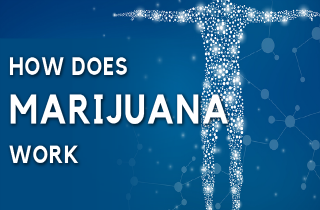Marijuana is currently an illicit drug in the U.S. containing the psychoactive chemical THC, which acts on the cannabinoid receptors of the brain.
But how does marijuana affect the body and brain? Does marijuana have the same effects for everyone? What are the dangers and side effects of marijuana use? And is marijuana addictive? We’ll explore all those questions and more in this article. Plus, we invite your questions about marijuana at the end.
How does marijuana work in the body?
When marijuana is smoked or ingested, THC is taken from the bloodstream to the brain. THC acts upon specific sites in the brain, called the cannabinoid receptors. Most cannabinoid receptors are found in the parts of the brain which influence pleasure, concentration, memory, and sensory/time perception. So when THC acts on the body’s cannabinoid receptors, this is what causes the “high” associated with weed, including symptoms of altered senses, and relaxation. Can you eat weed and get high? Yes, just like smoking. But the euphoric effect is what makes it possible to become addicted to THC – whether you are addicted to hash, addicted to synthetic weed or addicted to cannabis – the euphoric cause is the same.
Marijuana, especially when smoked, also effects other areas of the body which you may not know about. For example, marijuana can increase a person’s heart rate by 20-100%, raising the risk of heart attack. Smoke from marijuana can also irritate the lungs and can cause some of the same respiratory issues as smoking tobacco cigarettes.
How does marijuana affect the brain and nervous system?
Marijuana affects the central nervous system and can cause a variety of effects, including:
- anxiety or panic attacks
- distorted perceptions
- euphoric feelings
- hallucinations
- loss of motor control
- memory loss
- paranoia
- relaxation
But not all marijuana use is directed toward recreation. Marijuana can also be used medically. Because marijuana can reduce nausea, treat depression, and help control pain, in some states – notably Colorado and California – marijuana is legal if used for medical purposes. It is, much like narcotics and other addictive medications, available only under the direction of a physician. Research shows marijuana is most promising as a treatment for chronic conditions such as cancer (to reduce the side effects of chemotherapy treatment) or AIDS (to help stimulate appetite). However, there’s also questions about whether marijuana can be harmful to people with underlying mental health issues, with some research suggesting it may even increase the likelihood of schizophrenia.
How fast does marijuana work
When smoked, marijuana releases THC into the bloodstream instantly. THC can reach the brain within seconds – so the effects typically only take a few minutes to reach full effect. When marijuana is ingested in food or tea, it takes longer for it to enter your system, and peaks usually within an hour after ingestion.
How long does marijuana work?
Marijuana’s effects typically last 1-2 hours when smoked. When ingested, marijuana’s effects will be milder, but will last longer. However, marijuana can stay in your system for much longer than the effects it gives you and can be detected in drug screens for days or weeks after use, depending on frequency of use. How long does marijuana stay in the system? THC has a relatively long half life and is lipid soluble, which means that it can be stored in fat cells. Therefore, the blood plasma and urinary half-life of an individual dose of THC are best estimated at 3 – 4 days after ingestion. Chronic ingestion of marijuana increases the length of time THC stays in your system, which can be weeks long.
What makes marijuana work better
Marijuana works the most quickly when it’s smoked. However, for people with asthma or other lung problems, this may not be an option. (Smoking marijuana may also raise the risk of lung cancer and breathing problems.) For people using marijuana for medical purposes, the longer-lasting effects of ingested marijuana might be preferable. It’s often baked into food rather than being eaten on its own.
Does marijuana work for everyone?
No, marijuana won’t have the same effects for everyone. Some people may not get high or may not feel the pleasant effects of marijuana. Furthermore, people with a history of drug abuse and addiction may be unable to use marijuana casually. These people may become addicted to marijuana. While marijuana addiction is rarer than addiction to many other drugs, it’s still possible in chronic users. And although addiction to weed may not be as obvious as a narcotic addiction, you can still identify marijuana addiction using diagnostic standards for other drugs.
If you work for a big corporation or a government organization, you may be subject to drug tests and may not want to use marijuana. It can stay in your system for weeks and is easily detected by standard urine screens. If you might be risking losing your job, marijuana is not for you. Using marijuana is also a bad idea if you’re looking for employment, as many employers will subject applicants to drug testing. Even if you’re using it for medical reasons with a valid doctor’s prescription, the shaky legal status of medical marijuana means you might still be at risk of discrimination.
How marijuana works questions
Do you still have questions about how marijuana works in the body and brain? Please leave your questions or comments here. We welcome all experiences and inquiries, and will try our best to respond to you personally and promptly.









Related Posts